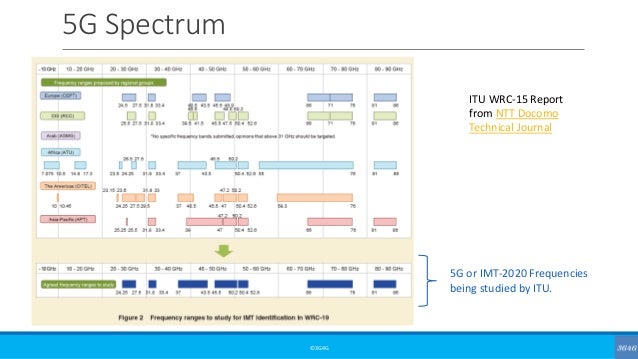At WRC-19 global spectrum regulators identified several millimetre wave frequency bands for 5G IMT with around 17 GHz of spectrum for 5G in the 26 40 45 47 and 66 GHz ranges identified for IMT globally or regionally. Lower 5G Frequency Bands future considerations The bands 600 MHz 700 MHz 800 MHz 900 MHz 15 GHz 21 GHz 23 GHz and 26 GHz are considered for traditional coverage applications and new specific usages such as Internet of Things IoT Industry Automation and Business Critical use cases.
 Radio Spectrum In The 5g Wireless World Insightaas
Radio Spectrum In The 5g Wireless World Insightaas
And 40 megahertz in the 36-38 GHz band at a cost of 168 million.

5g frequency spectrum. 5G mid-band spectrum provides coverage and capacity Spectrum in the 1 GHz 6 GHz frequencies is mid-band spectrum and it is considered ideal for 5G because it can carry plenty of data while also traveling significant distances. TDD bands at 4800-4990 MHz and 3800-4200MHz to complement the 5G primary bands in specific countries. UK comms regulator Ofcom has announced the final results of the auction for spectrum in the 700 MHz and 36-38 GHz bands following completion of the remaining stages.
Meanwhile Vodafone committed to pay 1764 million for 40 megahertz in the 36-38 GHz band. It will be the key enabler of future 5G services and be critical to 5G networks. Electromagnetic Spectrum and the 5G frequencies.
In the long term more spectrum will be needed to maintain 5G quality of service and meet growing demand. Bands being auctioned in 2021. Access Unlimited Streaming And Protect Your Data With Premium VPN Free Trials.
3300-3800MHz 2600MHz and 2300MHz are the primary frequency bands for 5G deployment and at least 80-100 MHz contiguous spectrum per 5G network operator. Some examples of radio spectrum bands include extremely low frequency ELF ultra low frequency ULF low frequency LF medium. These high frequencies make the 5G frequency band very complex.
In the UKs most recent spectrum auction O2 secured 210 megahertz of paired frequency spectrum in the 700 MHz band at a cost of 280 million 390 million. Ad Watch Spectrum Online From Anywhere in 2021. Every portion of the spectrum has a range of frequencies called a band that go by a specific name.
The 5G spectrum refers to the radio frequencies. Globally the focus is on the mid-band spectrum for initial 5G deployments. Radio wave frequencies range anywhere from 3 kilohertz kHz up to 300 gigahertz GHz.
55 rows First there is Frequency Range 1 FR1 that includes sub-6 GHz frequency. Quick Guide Easy Steps. All previous cellular spectrum sub-6 GHz range and above sub-6.
Compare Save Big. The 5G spectrum is a range of radio frequencies in the sub-6 GHz range and the millimeter-wave mmWave frequency range that is 2425 GHz and above. Sub-8GHz frequency band for 5G deployment.
Defining the 5G Spectrum. Ad Watch Spectrum Online From Anywhere in 2021. The 3400-3800MHz range is the primary 5G band in Europe several.
In March 2021 it announced the results of the principal stage which determined how much spectrum. Quick Guide Easy Steps. The GSMA describes spectrum in the 33 GHz to 38 GHz range as particularly appealing.
This momentum makes it vital that regulators assign as much contiguous 5G spectrum as possible in the range. Access Unlimited Streaming And Protect Your Data With Premium VPN Free Trials. For 5G the frequency spectrum of sub-6 GHz ranging between 450 MHz to 6 GHz and 24 GHz to 52 GHz are the frequency ranges of mmWave.
Some good examples of electromagnetic radiation include radio waves gamma rays visible light and also 5g. The majority of commercial 5G networks are relying on spectrum in the 35 GHz range 33 GHz-42 GHz. Compare Save Big.
Europe has agreed to harmonise frequencies in the 2425-275GHz band although its commonly referred to as the 26GHz band. The electromagnetic spectrum refers to the frequencies and wavelengths that encompass electromagnetic radiation which is the flow of energy at the speed of light through free space or a vacuum in the form of electric or magnetic fields.
